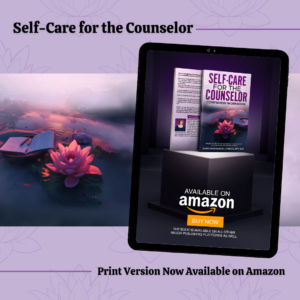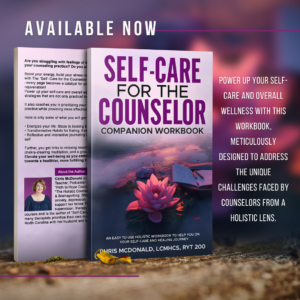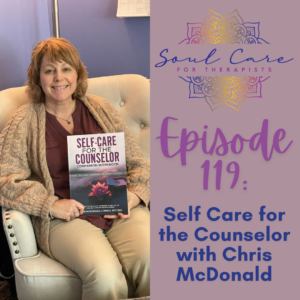As therapists, we are often so focused on caring for our clients that we neglect our own self-care. In Episode 119 of the SoulCare for Therapists podcast, I had the pleasure of speaking with Chris McDonald, a licensed holistic therapist, yoga teacher, and author. Chris shared her journey into holistic care, her approach to integrating holistic practices into therapy, and her latest workbook, “Self-Care for the Counselor Companion Workbook.” This blog post highlights the key takeaways from our conversation and offers practical tips for therapists to embrace holistic self-care.
Chris McDonald’s Journey into Holistic Care
Chris McDonald’s path to holistic care was a gradual one. Starting as a school counselor, she quickly realized that traditional talk therapy had its limitations. Her curiosity led her to explore breathwork, which provided remarkable results. As she transitioned into private practice, she continued to seek out additional holistic methods, eventually incorporating yoga and other practices into her therapeutic approach.
One pivotal moment in her journey was meeting a therapist who used yoga in sessions. Inspired, Chris pursued yoga teacher training and began integrating movement and breathwork into her therapy sessions. This holistic approach not only enhanced her clients’ mental health but also addressed their overall well-being.

Introducing the Self-Care for the Counselor Companion Workbook
In 2017, Chris published her book “Self-Care for the Counselor.” Recognizing the need for a practical companion to her book, she created the “Self-Care for the Counselor Companion Workbook.” This workbook is packed with exercises and techniques that therapists can use to care for themselves holistically. It covers aspects of body, mind, and spirit, providing a comprehensive approach to self-care.
The workbook is designed to be flexible, allowing users to start with any section that resonates with them. It includes interactive elements, such as QR codes linking to meditations, self-massage instructions, and yoga classes. Chris emphasized the importance of making self-care practices accessible and practical for busy therapists.

The PIECES of Health: A Holistic Self-Care Plan
Chris shared an acronym from her workbook that outlines the essential components of a comprehensive health plan: PIECES. Each letter represents a different aspect of self-care:
- Physical Health: Focus on eating well, maintaining sleep routines, and incorporating movement into your daily routine. Preventative care and regular medical check-ups are also crucial.
- Intellectual Health: Engage in continuous learning and mental stimulation. Activities like journaling and solving puzzles can keep your mind active and healthy.
- Emotional Health: Regularly check in with your emotions and thoughts. Therapy for therapists is essential, as is finding effective ways to manage stress and avoid burnout.
- Creating Support Systems: Building a strong support network is vital. Connect with colleagues, friends, and community groups to avoid isolation and foster a sense of belonging.
- Energetic Health: Learn to clear negative energy and protect your own. Simple practices like intentional hand washing and energy clearing exercises can make a significant difference.
- Spiritual Health: Whatever your spiritual beliefs, find practices that help you connect and ground yourself. Whether it’s through nature, prayer, or meditation, nurturing your spiritual health is key to overall well-being.
Practical Tips for Therapists
Here are some practical tips from our conversation that you can start implementing today:
- Incorporate Movement: Find ways to integrate movement into your daily routine. Even simple exercises like stretching or yoga can have profound effects on your mental and physical health.
- Establish a Sleep Routine: Prioritize your sleep by creating a consistent bedtime routine. This can include activities like journaling, meditation, or reading to help your mind wind down.
- Clear Negative Energy: Use intentional practices like hand washing or energy clearing exercises to release any negative energy you might pick up from your clients or environment.
- Build a Support Network: Make a conscious effort to connect with colleagues, friends, and support groups. Regular interactions with others can provide emotional support and reduce feelings of isolation.
- Explore Spiritual Practices: Whether through meditation, prayer, or spending time in nature, find ways to connect with your spiritual self. This can provide a sense of grounding and purpose.
Conclusion
Holistic self-care is essential for therapists to maintain their well-being and provide the best care for their clients. Chris McDonald’s journey and her workbook, “Self-Care for the Counselor Companion Workbook,” offer valuable insights and practical tools to help therapists embrace a holistic approach to self-care. By focusing on the PIECES of health and integrating simple yet effective practices into our daily routines, we can ensure that we are taking care of our whole selves—body, mind, and spirit.

If you’d like to learn more about Chris’s work and her approach to holistic care, be sure to check out her book and workbook on Amazon. You can also tune into her podcast, “The Holistic Counseling Podcast,” for more tips and insights on integrating holistic practices into therapy.
Links and Resources
-
Sacred Space Community Groups – with Dawn
-
Soul Care Retreats: Exclusively for therapists who want to recharge in a deep and fulfilling way. You will engage in your own spiritual journey, find some release from the work you do, as well as connect with other therapists all while enjoying the beauty of Colorado at a secluded and peaceful retreat center. Limited to 6-8 therapists.
-
Show Notes and Podcast Production by Course Creation Studio.
-
Podcast for Holistic Counseling https://www.facebook.com/holisticcounselingpodcast
-
Linked in: https://www.linkedin.com/in/chris-mcdonald-bb831823/
How to Build Confidence as a Holistic Therapist
